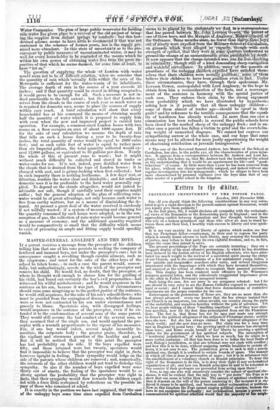MASTER-GENERAL ANGLESEY AND THE BOYS.
Jr a parent receives a message from the preceptor of his children telling him that one of his sons persists in seeking the company of lowlived and immoral boys, not under the preceptor's care ; has in consequence caught a revolting though curable ailment, such as the ringworm; and must for the sake of the other boys of the school be taken home,—in such a case the parent would, sorrow- fully, but unhesitatingly, accede to the wish of the preceptor and remove his child. He would feel, no doubt, that the preceptor, of whom he thought well enough to choose him for the guiding of his child, had found out certainly the boy's evil propensities—had witnessed his wilful misbehaviour ; and he would acquiesce in the sentence on his son, because it was just. Even if circumstances should raise some misgiving as to the perfect justice of the sentence, he would still acquiesce, for the sake of his son's schoolfellows ; who must be guarded from the contagion of disease, whether the disease were or were not contracted by his son under circumstances not gravely to blame. Spectators also, with disengaged feelings, would acquiesce in the sentence of the preceptor, even if he ex- tended it to the condemnation of several sons of the same parent. They would still assume the bad conduct of the several sons, as they assumed that of the sin&le son, and would applaud the pre- ceptor with a warmth proportionate to the vigour of his measures. For, if one boy would infect, several might incurably in- noonlate, the corporate body : the greater praise, therefore, to the vigilant and strenuous guardian of the healthy and good. But it will be noticed that up to this point the preceptor has had probability on his side. If the boys expelled were fifty, and those retained were but twenty, spectators would find it impossible to believe that the preceptor was right in facts, however upright in feeling. Their sympathy would lodge on the side of the parents whose children are removed ; and, numerically, the interests of the other children would not tend to dislodge this sympathy. So also if the number of boys expelled were some thirty out of ninety, the feeling of the spectators would be so strong against the probability that the preceptor was right in facts, that their sympathy would flow towards the children expel- led with a force little restrained by reflections on 'the possible in- jmy of those who remained at school.
It is exactly in-the position we have last supposed, that the ease of the unhappy boys some time since expelled from Carshalton
isfter0A-F
guilt P and by reference to the terrible consequences that the equal- sty of harshness has already worked. In more than one case a commission has been refused; in several the public schools have been closed to the marked sheep of the unhappy flock ; and in an I that. has-. • asking how is it possible that all these unhappy children— some of them almost of tender age—should be eqtrad in their each case. They enforce their claim by the strong argument from probability which we have illustrated, by hypothesis ; Leveson Gower, corresponded with Lord Anglesey, in the hope to obtain from him a reconsideration of the facts, and a rearrange- ment of the sentence in harmony with the special justice of believe their children to have been ss even in fact.,:, ,iincier these circumstances, they have, through their spokeenisa Mr. groundthevharge, bLexliuismou 1 guardians,, ' t4k110413PY '`hilic-0S416(1 li*„ :, ft-6d ihem= selves that :their:children were ino guiltless s-1'": t 41 Ift Ike* of4lith thtimai • &hooks.
in crimin ' , 'thouglr•gtilkloil a kind tlemandingcshaspeaettgation and watc . "purveillandelif'ttradditIonmtritin frohttlito( • areirts :dr one of those: beysoin a. Arc; ,Ogiesey, the Oil =-13bme-rabnthinsiniiii,,nol fewer than thirtii- stre o ep tte :, . , . f . ■ r : ;; WWI
It now ap ars that the chargaainten twaa,,nms :: 9 ., -8
like/ alai .6nia
p
case a parent has fallen a victim to grief and the overwhelm- R ev 4 , i [tho Isliwitli:enole
Iveri,fuld in a oorfeepondencei Y.4e4Gower, arch 3
. -even , lr ,,,,.... ,,, quill9g ! : -10: : td, to ing weight of unmerited disgrace. We cannot but express our sympathizing sorrow at the whole case, and our hope that some means may yet be allowed for more justly apportioning the weight of chastening retribution on juvenile transgression.* • The case of the Reverend Samuel Andrew, late Master of the School at Carshalton, has also, to the public eye, all the characteristics of gross injus- tice. It appears from a correspondence between Mr. Andrew and Lord An- glesey, which lies before us, that Mr. Andrew took the headship of the school on the understanding that it would be an appointment for life—and " good- behaviour " of course. In little more than a year he has been removed from his place, without any charge specifically assigned, and indeed without any regular investigation into his management ; which he alleges to have been more characterized by personal vigilance over the boys than that of any other master of a public school in the kingdom.


























 Previous page
Previous page